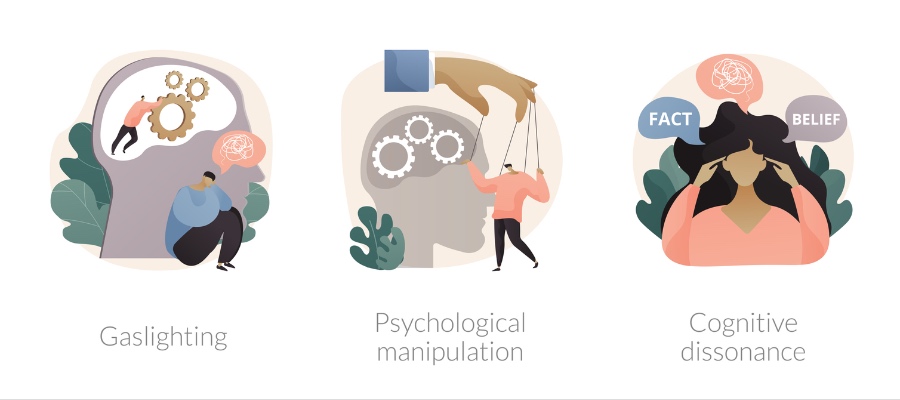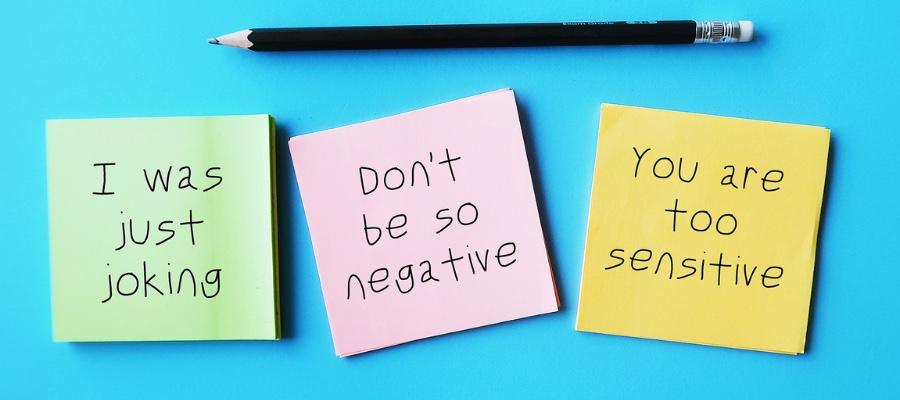The views expressed in our content reflect individual perspectives and do not represent the authoritative views of the Baha'i Faith.
Have others gaslighted you, or have you gaslighted yourself? Learn about the different types of gaslighting and what damaging behaviors you should be cautious of for the sake of your overall well-being.
RELATED: You Are Who Your Friends Are, So Choose Wisely
What Is Gaslighting?

The term “gaslighting” originated from the 1938 play “Gas Light” and the film adaptations that were inspired by it. This psychological thriller is about a criminal who marries a woman because he wants to steal her famous jewels. To avoid arousing suspicion, he manipulates her into believing that she is losing her sanity so she won’t question his actions and discover his true intentions.
Gaslighting, then, as defined by Merriam-Webster, is the “psychological manipulation of a person, usually over an extended period of time, that causes the victim to question the validity of their own thoughts, perception of reality, or memories and typically leads to confusion, loss of confidence and self-esteem, uncertainty of one’s emotional or mental stability, and a dependency on the perpetrator.”
This “act or practice of grossly misleading someone, especially for one’s own advantage” manifests itself in several different ways.
RELATED: Do Movies Romanticize Domestic Violence?
The 5 Different Types of Gaslighting

Below are the five different types of gaslighting that a manipulator can use in any type of relationship.
1. Coercion
Coercive gaslighting is a form of emotional, verbal, physical, or financial abuse that involves threatening or intimidating someone to submit to the gaslighter’s will. The aim of this type of gaslighting is to exert power and control over the victim, often by creating a fearful environment and dissuading the victim from exercising their independence.
The Universal House of Justice, the global governing body of the Baha’i Faith, condemned this coercion. They stated:
There can be no justification for anyone compelling another, through the use of force or through the threat of violence, to do that to which the other person is not inclined.
Here are examples of coercive gaslighting:
- Your partner threatens to harm themselves if you consider leaving the relationship, making you feel responsible for their well-being and forcing you to stay.
- Your friend convinces you that other friends are talking behind your back, isolating you from your social circle so you rely solely on them for support.
- Your boss undermines your achievements and blames you for issues beyond your control, coercing you into working longer hours and assuming more responsibilities without additional pay.
- Your relative claims that you are irresponsible and incapable of managing family affairs, pressuring you to give them control over shared assets.
2. Lying
In the early 1900s, Abdu’l-Baha, one of the central figures of the Baha’i Faith, said:
Consider that the worst of all qualities and the most odious of all attributes, and the very foundation of all evil, is lying, and that no more evil or reprehensible quality can be imagined in all existence. It brings all human perfections to naught and gives rise to countless vices. There is no worse attribute than this, and it is the foundation of all wickedness.
Sadly, gaslighters, especially narcissists and pathological liars, may blatantly lie to make someone doubt their thoughts and question their perceptions so they can continue to get away with their wrongdoings.
Below are examples of how a gaslighter might lie:
- Your partner insists that you’re overreacting to and misunderstanding inappropriate flirtatious texts that you found on their phone or social media platforms, even though their romantic intentions with the other person were obvious.
- Your colleague tells your boss that you didn’t complete one of your tasks, even though you had proof that you did.
- Your friend claims that they never said they would pay you back for the loan that you gave them.
- Your relative denies hurting you in the past, despite you clearly remembering their comments and how they made you feel.
3. Scapegoating
Here are examples of how gaslighters might scapegoat:
Often, gaslighters try to blame others for their transgressions to avoid taking responsibility for their actions.
- Your client blames you for the delay in completing a project after they failed to respond to your inquiries and requests.
- Your significant other tells you that they only cheated because you neglected them.
- Your teacher blames you and your classmates for not grasping the material.
- Your team leader scapegoats you and your team members for project setbacks despite unclear roles and directions and no support from management.
4. Reality Questioning
Psychologically manipulating people so they question their reality and doubt their memories is what often comes to mind when they think of the term “gaslighting.” Reality questioning gaslighting erodes the victim’s trust in themselves as they begin to doubt their own observations, instincts, and intuition and rely on the gaslighter’s version of events, leading to confusion and isolation.
Examples of reality questioning gaslighting include:
- Your business partner denies agreeing to specific terms of a deal or contract, even though you have written notes and a clear recollection of the discussion.
- Your friend assures you that they didn’t lie to you and that you must have misunderstood them, making you doubt your perception of the conversation.
- Your supervisor insists that they gave you specific instructions on a project that you don’t recall ever receiving, causing you to doubt your memory and capabilities.
- Your date is a no-show, and then later, they say that they never made plans with you, despite you clearly remembering the arrangement, making you doubt your social interactions.
5. Trivializing
Trivializing is another common type of gaslighting that involves minimizing or dismissing a person’s thoughts, feelings, or contributions to make them think that what they have shared or experienced is trivial.
While trivializing isn’t always intentionally malicious, it’s almost always hurtful. Below are examples of how gaslighters may trivialize:
- Your relative tells you that the trauma that you have experienced is not that serious.
- Your friend makes fun of your phobias and tells you to toughen up.
- Your partner tells you that you’re too sensitive when you ask them to treat you with respect.
- Your acquaintance tells you to stop complaining when you bring up the discrimination that you have experienced.
Sadly, there are many different types of gaslighting — all of which can have a negative effect on a person’s mental, emotional, physical, social, and spiritual well-being. As Abdu’l-Baha said:
If we are caused joy or pain by a friend, if a love prove true or false, it is the soul that is affected. If our dear ones are far from us—it is the soul that grieves, and the grief or trouble of the soul may react on the body.
…When we find truth, constancy, fidelity, and love, we are happy; but if we meet with lying, faithlessness, and deceit, we are miserable.
So, it’s important for our total health to break free from toxic relationships that have an established pattern of intentionally malicious gaslighting and deception. Of course, some people in our lives may, on occasion, accidentally gaslight us, which is why it’s necessary to address these behaviors and establish boundaries, explaining why certain statements and actions are inappropriate and unacceptable.
By understanding and identifying these different types of gaslighting, we can protect ourselves from becoming victims and avoid gaslighting ourselves.
















Comments
Sign in or create an account
Continue with Googleor